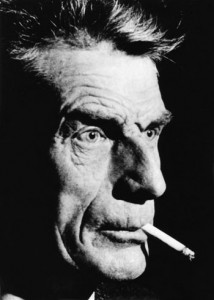James Pate at Montevidayo says some really precise stuff about chaos and art, ending with this (YES): “With both–and with Grosz too, I would say– we’re left with an aesthetic that I like to think of as the abandoned house approach to art. You go in and wander around, but no one lives there anymore.”
Desert Island Reading: A Return to Beckett
 Right before Thanksgiving, I came down with some kind of one-off swine flu and convalesced at my parents’ house before leaving with them to spend the holiday in coastal Florida. The day we left, I had to teach all afternoon and leave directly after, leaving no time to collect the books from my house that I so dearly wanted to read at the beach (my glory box of 10 for $65 from Dalkey had just arrived). Instead, I had under 5 minutes to grab whatever I could from my parents’ house.
Right before Thanksgiving, I came down with some kind of one-off swine flu and convalesced at my parents’ house before leaving with them to spend the holiday in coastal Florida. The day we left, I had to teach all afternoon and leave directly after, leaving no time to collect the books from my house that I so dearly wanted to read at the beach (my glory box of 10 for $65 from Dalkey had just arrived). Instead, I had under 5 minutes to grab whatever I could from my parents’ house.
This seemed a bit like a realer, truer version of those desert-island lists people make. For if you were actually stranded, you wouldn’t be able to come up with an ideal reading list; you will be stuck with whatever is at hand. Luckily, my brother and I have both stashed at our parents’ books that we’d bought forever ago and hadn’t gotten around to reading or taking to our own places, so there were some good options–just zero time to pick carefully among them.
I ended up with, among other volumes, two French Dual Language books and Samuel Beckett’s Watt. By the time I arrived at the beach, my ambition of trying my hand at translating by covering up the English side of French books and then checking had dissolved. I felt a bit unequal to Watt, too. I’ve loved Beckett since I first saw some productions of his plays in Paris, and since then I’ve read a few other plays. But I’ve only read his novels in grad school, where the blows of Molloy, Malone Dies, and The Unnameable were softened by my most excellent teacher, David Gates.
Since then, I have felt, somehow, as if I couldn’t withstand Beckett’s prose on my own, the dead weight of his sentences, his spine-twisting anti-proverbs, the desolation, the threat. But there I lay, on a brilliantly sunlit balcony overlooking the Gulf of Mexico, staring into Beckett’s considerably less sunny universe. And now I’m going to try to convince you why you, too, should turn, or return, to Beckett, Watt specifically. READ MORE >
Your favorite bitter literary characters on Omegle
 Whoever said Omegle is the Internet-chat version of truckstop-bathroom sex didn’t think to throw ‘great literature’ at it to, you know, maybe class it up a bit. Well, I thought it, and I threw it, and I somehow still feel dirty, ashamed, and full of regret. I feel like I’ve ruined something.
Whoever said Omegle is the Internet-chat version of truckstop-bathroom sex didn’t think to throw ‘great literature’ at it to, you know, maybe class it up a bit. Well, I thought it, and I threw it, and I somehow still feel dirty, ashamed, and full of regret. I feel like I’ve ruined something.
I give you the underground man chatting on Omegle, followed by Molloy chatting on Omegle.
Play by Samuel Beckett, Parts 1 & 2
httpvh://www.youtube.com/watch?v=NdTjRumkT9k
httpvh://www.youtube.com/watch?v=1EkI1KS3uRA
via the blog of the much-admired artist Robbie Cooper.
Power Quote: Beckett

Thus the sixpence worth of sky changed again, from the poem that he alone of all the living could write to the poem that he alone of all the born could have written.
– Murphy, p. 83
